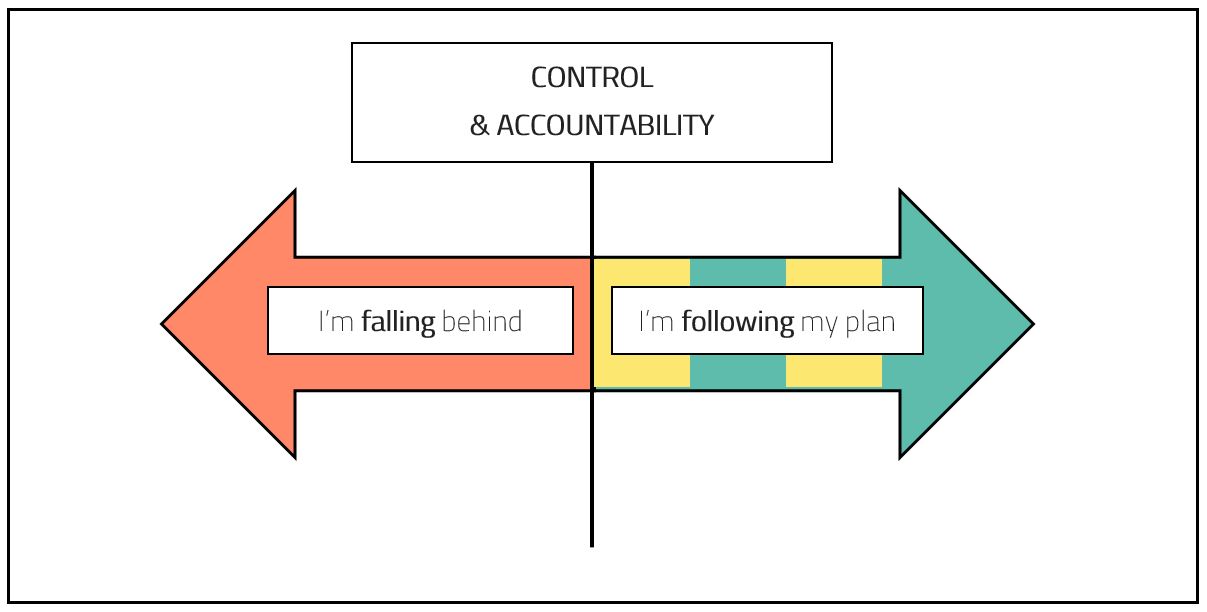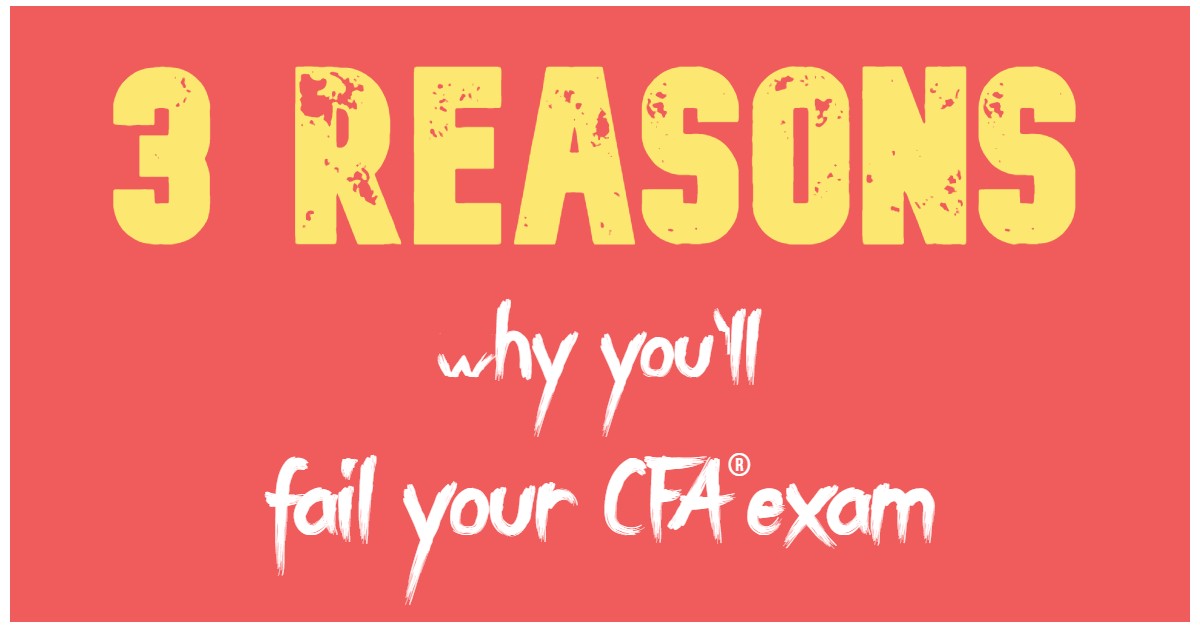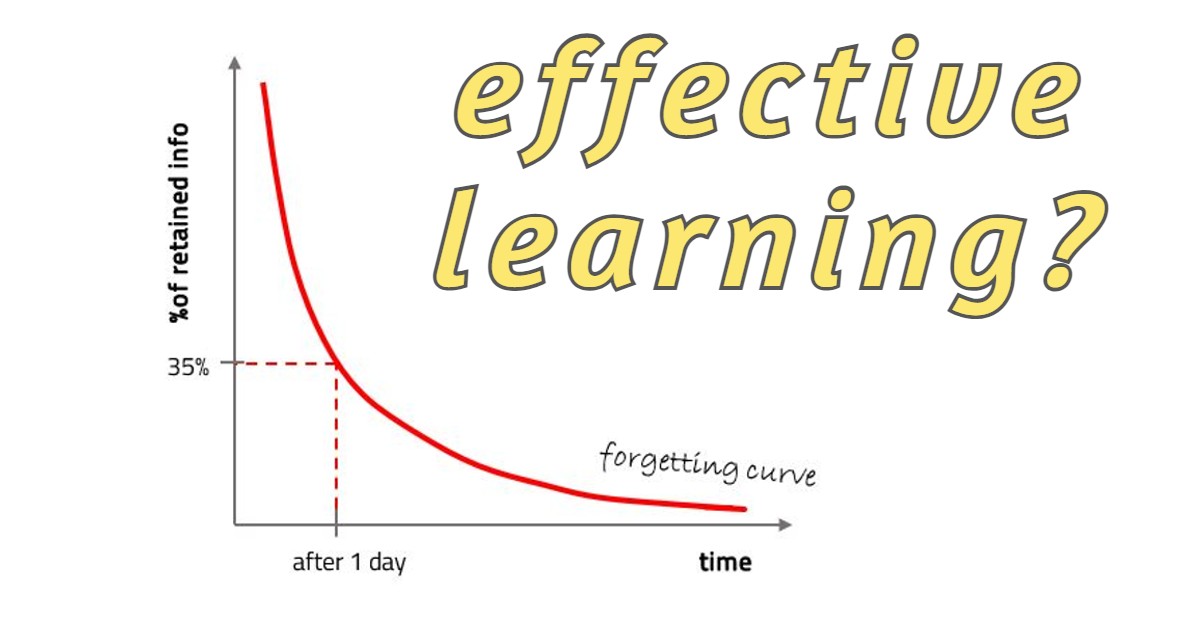
- What If I Fail Level 1 CFA Exam?
- If I Fail CFA Exam Do I Have to Pay Again?
- How Do I Do Better If I Fail CFA Exam?
- Failed CFA Exam - Blessing in Disguise
- Controlling CFA Exam Prep
- Benefiting from Weekly Study Routine
What If I Fail Level 1 CFA Exam? What Do I Do?
If you failed your level 1 CFA exam, there’s nothing to be ashamed of. Most CFA candidates fail their CFA exam at least once. I mean, just look at the CFA exam pass rates, which are rather low, especially for the level 1 exam...
It's a common thing that CFA candidates need to retake their exams. So, it's OK if you fail, though I perfectly get it if you're angry or sad right now!
If you failed your level 1 CFA exam, that's what you should do step by step:
- Reset. This doesn’t define you. Failing a CFA exam is quite common.
- Retake your CFA exam. Mind the rule of 6 months between your exams.
- Register for your next CFA exam. No discount is available but no more enrollment fee (read more below).
- Analyze your performance in the exam you failed. To this end, look at your CFA exam results report.
- Get a good study plan and improve your learning process to finally succeed!
Technically speaking, after you fail your level 1 CFA exam, you need to retake the exam (unless you want to drop out of the CFA Program). To sit your next level 1 exam, you need to obey the rule of 6 months between the exams. It means that at least 6 months need to pass between the exam you failed and your new exam window. Of course, you can retake your CFA exam at a later date, say in a year.
If I Fail CFA Exam Do I Have to Pay Again?
If you fail your CFA exam, you have to pay again. The level 1 retake fee is equal to the registration fee applicable for a given year and exam. In 2026, the retake fee for level 1 CFA candidates is USD 1140 (early) or USD 1490 (standard) and it's up from USD 990 (early) or USD 1290 (standard) plus it's higher for higher levels. This comes as a result of CFA Institute's major changes to the 2026 CFA exam registration fees and the enrollment fee.
So, to retake your level 1 CFA exam, you need to register for a new level 1 exam (mind the registration deadlines!) and pay your registration fee. There's no discount on your next CFA exam registration fee when retaking the CFA exam.
How Do I Do Better If I Fail CFA Exam?
To succeed, you want to be well-prepared for your next CFA exam. Before you take up your prep, you should analyze your performance in the previous exam. Your CFA level 1 results are divided into two parts. The first part is your overall CFA exam score, which is either PASS or DID NOT PASS. By looking at the thick line that illustrates Your Score presented as a scale score, you can see how much you missed the MPS (minimum passing score) and how much better you need to do next time. The second part is detailed scores for topics, which can be very valuable, so use it to your advantage! It shows what topics you need to catch up on and which are relatively fine. The visual presentation of your CFA exam results is available in your CFA Institute account.
Last but not least, if you failed your level 1 CFA exam, you definitely need to improve your learning process and have a good study plan for starters. Without a good study plan, too many things can go wrong, which you probably know by now from experience.
How a Failed CFA Exam Is Your Blessing in Disguise
When we fail we feel unhappy. That’s perfectly normal.
But today I’d like to convince you not to fret over your FAILED NOV 2025 CFA exam. Yes! Don't worry! ‘Cos a failed CFA exam – though surely not cool right now – is an opportunity for a meaningful change in your life!
Just think about it. By failing your exam you gained some valuable (though bitter) experience and it would be a pity to waste it… I’d even say that what you decide to do now will substantially affect your whole future life (read on to find out why ).
That's the way I see it: you need to act upon your failure to make it into your 3 personal successes:
- mindful acceptance of the unfortunate FAILED score,
- fruitful CFA exam prep that builds on your failure,
- desired PASS score in your next CFA exam.
Learning from Failure
So, first of all, you need to come to terms with your failed CFA exam. It is essential for you as a human person.
Psychologically, every failure is a difficult experience and to deal with it successfully, you need to work your way through it (ideally, towards acceptance). That’s objectively how we – humans – function.
So, take a moment to sympathize with yourself. Call your friend with the bad news. Moan and groan if you will. It’s your privilege of the moment.
WHAT TO DO IF I FAILED MY CFA EXAM?
- 1. Accept your CFA exam failure and find determination not to make the same mistakes next time.
- 2. Be frank with yourself about the successes and fiascos of your previous CFA exam prep.
- 3. Find out what you can do to turn your previous fiascos into your future successes.
After you’ve taken a while to grieve your failed NOV 2025 CFA exam, it’s time to move on. The best thing you can do about this failure is to learn from it. Do that and you’re in for the best CFA exam prep you’ve ever had.
Psychologists say it’s an attribute of a growth mindset to learn from mistakes. I think it’s an admirable quality worth following suit. You can definitely have a more fruitful CFA exam preparation before your next exam if you choose to learn from your failure. All it takes is some introspection. An honest self-analysis that unveils your weaknesses and helps you develop your strengths.
HOW TO IMPROVE MY CFA EXAM PREP?
- 1. Reflect on your weak points as a student.
- 2. Hold yourself accountable for your study planning and execution
(mark your reading assignments green, yellow, and red – which color dominates?). - 3. Build your study routine.
- 4. Focus on small goals.
- 5. Control weekly (sum up your weekly achievements and react if there are too few).
Controlling Inconsistent & Messy CFA Exam Prep
The self-reflection story is yours to tell, not mine. But I bet I know some of your major study pains [because I know what it means to plan for something big and eventually fail ].
If I were to bet 2 things that defeated you during your NOV 2025 CFA exam preparation, I would go for:
- inconsistent studying
- and
- messy planning,
which basically means a lack of control over your exam prep and study plan.
Without CONTROL it’s never going to change – your exam prep is always going to be inconsistent and messy.
To make a real change, you need to find means to hold yourself accountable both for your study planning and for your execution.
For accountability purposes, you can make an Excel file where you’ll put all your reading assignments planned for a given week and then mark them green for done, yellow for partially done, and red for overdue. What’s great about this approach is that you can see (A) how well you’re doing – if there’s lots of green and yellow or (B) how much you’re lagging – when it gets too red.

And if you don’t want it to get too red, you need to build your study routine.
My recommendation would be a 3-step week-to-week study routine with:
- - planning at the beginning,
- - execution throughout the week, and
- - summing up your plan and its execution at the end of the week .
A week is a perfect time frame – weekly plans are something you can easily control, carry out, and react to. If it works for client meetings, taking children to school or laundry, it can surely do the trick with studying as well.
I’d say that the 3rd step of this study routine is particularly important – it urges you to confront reality (so don’t skip it!). Because one thing is your study plan and quite another is execution. I’m confident you agree with me on that. If you want to stop being inconsistent and messy, you need to hold yourself accountable on a weekly basis by assessing your weekly study achievements (summing up how you executed your plan). React if needed while planning your next study week – with flexibility understood as sound management, and not easy excuses, you are still in charge of your CFA exam preparation.
Benefiting from Weekly Study Routine
So, getting into such a weekly study routine benefits you because:
- it gives you small goals to focus on and control,
- it provides enough structure to dive into your exam prep,
- it allows for a lot of flexibility if some things come your way,
- it urges you to regularly confront reality.
Focus on your small weekly goals, like for example:
My 1st goal: Mon/Tue – do QM* Reading 1
My 2nd goal: Wed/Thu – do QM* Reading 2
My 3rd goal: Fri/Sat – do QM* Reading 3
My 4th goal: Sunday – sum up how I’m doing
(following my study plan or falling behind?)
Block the time in your calendar according to your weekly plan.
* QM – Quantitative Methods
With small and concrete goals, execution becomes easier. At this stage of your preparation, you can build on your previous experience with CFA exam topics. After your NOV exam, you know which topics turned out to be a problem and which were OK with you. Devote more time to those that have proven hard and reasonably less to those you can handle better.
As soon as you complete an assignment – mark it green (for partially done – yellow). If you fail to do it over the week – mark it red (and preferably move it to the next week). That’s how you practice your everyday accountability.
Both color labeling and summing up your weekly achievements hold you accountable and put you in control of your study planning and execution. That’s exactly what you need to avoid inconsistent and messy exam preparation.
You can follow this ‘weekly control’ approach on your own, e.g. based on your Excel file, or you can spend your CFA exam prep with us by creating and following your free personalized "STAY-IN-CONTROL" study plan that holds you accountable:
on a daily basis – you can check off your study lessons as you do them and watch your CFA exam readings first go yellow, then green
on a weekly basis – you can sum up your study week as it ends
[click the SUM UP button in the STUDY view of your Study Plan]
flexibility-wise – you can personalize your Study Plan whenever you need, e.g. by editing your study weeks [use DRAG&DROP in the PLAN view of your Study Plan]
With such control and accountability (plus a fair analysis of your previous prep), you’re bound to have a fruitful preparation time. The next natural step for you is to pass your next exam .
While striving for this GREAT GOAL, remember the saying: Rome wasn’t built in a day. Just as Rome was built stone by stone, also you need to go reading by reading from week to week. All throughout your CFA exam prep, your goal must be something you can control. It has to fit into your everyday perspective. Your GREAT GOAL: "Pass my next CFA exam" is simply too big for you to control from where you stand now. But you can surely control the goal: "Do my QM Reading 1 today".
That’s why it is so crucial for you to take your exam prep in weekly chunks. Your ultimate goal of passing your next CFA exam is distant and difficult to pursue.
Unless... you do it week by week:
When I said at the beginning that your failed CFA exam can be your opportunity, this is exactly what I meant. Confronting the problem and learning some ways of doing things better. You have 2 choices: either leave it as it is OR use your failure to your advantage.
Let your failed NOV 2025 exam teach you a lesson and you’ll see your skills and character develop. Adopt the growth mindset style when preparing for your next exam. This way you’ll be able to cope better not only with your CFA exam but also with other long-term goals you’ll be pursuing later in your life (you’ll already know that the strategy of weekly control works ).
Go on! Take what's yours!
With fingers crossed for you, Margaret
About Soleadea:
Our CFA Exam Study Planner is available to candidates of all levels at groundbreaking Pay-What-You-Can prices. You decide how much you want to pay for our services. After you activate your account, you get unlimited access to our Study Planner 4.0 with study lessons inside, various level 1/level 2 study materials & tools, regular review sessions, and a holistic growth approach to your preparation. Join
Read Also:




